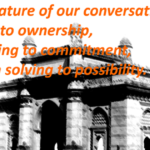The Delhi Chief Minister’s Urban Leaders Fellowship 2016
The Delhi Chief Minister’s Urban Leaders Fellowship (CMULF) program provides a unique opportunity to young leaders across India to work within the state government to address some of the most pressing urban challenges in India, and experience what “making change happen” looks like. The Fellowship aims to attract outstanding young men and women who are passionate about public service and are willing to work in GNCTD for one or two years.
The fellowship will start by 1st September, 2016 and the deadline for completion and submission of the application is 4th July, 2016. Candidates must be 21-35 years old at the time of applying and must have a Bachelor’s degree in any academic discipline. Approximately 30 fellows will be selected in 2016 and will be entitled to a remuneration of up to INR 1,25,000 per month depending on their academic, professional and work experience. For more information about the program, you can visit: www.cmulf.delhi.gov.in
In case of any queries, please send us an email at [email protected] or tweet to us @swaniti
Community Connect Fellowship 2016
The Community Connect Fellowship (CCF) has opened its applications for the 4th batch of fellows to join in MUMBAI !
Being young has so many questions in our heads…
Should I have fun? Or work hard for my career?
Wait…what about the society around me?
Is it the one I would ideally want to live in?
But what can a young person like me do who is already loaded with the above thoughts!?
CCF has a combined solution to all these questions.
It is a part-time fellowship offered at no cost to young people (18-25 years) in Mumbai
A 7-month leadership development program empowering youth to be active citizens through service learning.
It also aims to develop their employability skills through on-ground action including mobilizing volunteers and facilitating democratic discussions.
Who can apply?:
· Anyone who is 18-25 years of age
· Wants to build essential real life skills that classroom teaching lacks
· Love to do on ground action for creating change in the City
· Wants an edge in your life and CV over regular academics
How to Apply?
· Fill the online form on www.ccf.brmworld.org
· Attend the orientation (details of the venue would be sent via email to applicants and updated on the website)
Last date to apply: 30th June 2016
For more details please check: www.ccf.brmworld.org
How to know when not to volunteer
Volunteering is an act of giving back to the society, to ensure its smooth functioning, and to help shape ourselves as individuals. While active involvement does create a significant impact on the cause we’re working towards, there’s a possibility of overextendingourselves and experiencing a burnout.
Remember, this blog does not intend to discourage you from volunteering. Rather, it explore occasions when volunteering may not be your cup of tea, or when, at the very least, you need to vary your volunteering activities.
1. Don’t volunteer if you face a time constraint. Don’t involve yourself in volunteering if you’re unable todevote the necessary time. Because, your absence or rare presence during key moments or otherwise, may disrupt the smooth functioning of designated activities, and result in other volunteers having to take up additional responsibilities. This is especially important if you have signed up to visit school children or nursing home residents, because, if you’ve met them once or twice, they tend to quickly depend on you and look forward to your visits. As a result, when you don’t show up, they may feel your absence. In essence, it’s better not to offer at all than to let someone down.

2. Decline if you are already over-committed to volunteering. If you are already on a parent’s board, or helping adults learn English, in addition to working full-time, you may be starting to spread yourself too thin. In such circumstances, don’t feel obliged to take on more responsibilities, even if somebody asks you to. Volunteering overload is not good for you, your family or your work performance, and it certainly isn’t good for the organisation you’re volunteering for, because, they can’t rely on your presence. Instead, inform the organisation (you’re volunteering for) about your packed schedule, and remind them that you are open to volunteering in future, when your current obligations have been met. Then again, you do not owe any explanation whatsoever. You can simply say “I am not available”.
3. Avoid volunteering activities for which you don’t have the temperament for: Don’t become a volunteer firefighter if you’re afraid of fire or if you lack physical fitness. And, don’t become a health assistant volunteer if you tend to faint at the sight of blood. Instead, take roles that are better suited for you and leave the rest for others to take up. Alternatively, tell the volunteering organisation what your skills are and let them find a position better suited to your aptitude and interests. It’s far more helpful to devote a few hours in doing something that you can do well, rather than volunteering many hours towards something you’re not suited for.
4. Be careful about taking on volunteer work that is “close to home”. What we mean is, ensure that your personal problems and emotions don’t spill over into your volunteer work, in a way that it impacts negatively upon you. For example, if you have been abused yourself and you have decided to help others who are abused, be absolutely certain that you have worked through issues that are likely to be raised in your role as a volunteer. You don’t want to break down when confronted with an issue that is still very raw for you. This is not to say that you shouldn’t find catharsis in facing the issues head-on through volunteering, but it does mean that you must be strong enough to cope up with your emotions as they are likely to be presented back to you by someone else suffering from it.
5. Be aware of the fact that there are certain stages in your life when volunteering may not be a good option for you. Although temporary, there will beperiods in your life when you’ll have to step down from volunteering. These may include: death of a family member, exam time, birth of a baby, illness and such. Each of these activities rate highly and you are well within your rights to put all your efforts into seeing yourself and your family through the temporary disruption. In time, you will have recovered or moved on from the hard part and be ready to return to helping others. This is about knowing when to let others help you for a short time. On the other hand, volunteering can sometimes be the only reality you have to hang onto, to provide you with stability, such as when you’re going through a divorce or when you’ve lost your job. Carefully weigh your personal, physical and emotional demands as compared to what energy you may have remaining to expend on others; be honest before overdoing things. You’ll be a better volunteer if you take time out to strengthen yourself first.
6. Avoid volunteering for something just because a friend is volunteering. You must care about the cause that you volunteer for; a reason such as “my friend is doing it, so I should too,” is unsound. By all means, join a friend if both of you are truly keen on the work involved, but if you only do it for your friend’s sake, you may end up resenting the volunteer work and perhaps even your friend. In such circumstances, tell the over-enthusiastic friend that you support him or her, but that your volunteering interests are being placed elsewhere.

7. Don’t be bullied, coerced or co-opted into volunteering. It is not unusual to be elected at a meeting which you do not attend, or to be pushed along by a crowd unwilling itself to take on a position that a club/school/organisation needs filled. If you are present at such a vote, strongly vocalise your refusal to take up the position. State clearly that you are not in a position to take up such a responsibility at this point in time. If it happens in your absence, send a gently worded letter refusing the position to the board, setting out brief reasons why you do not accept the nomination. Or, simply say you do not accept. You must want to undertake the volunteer work, otherwise you may face challenges pertaining to time management and other commitments.
8. Question authorities who seek to over-rely on volunteers. If you feel that an organisation or school is asking too much of its volunteers, speak up and say that this work ought to be performed by a paid personnel. In such cases, exercise your letter-writing or phoning skills and ask the school principal, the local municipality or your locally elected member why the funding is so low for certain activities. Additionally, ask that paid employment be considered or additional financing be provided to ease the pressure off of over-worked volunteers.
9. Ensure that volunteering does` not sap your time/ energy/ finances/ good will. If you really want to volunteer but you can’t, think of other ways to help out. If you have the money but no time, donate the money. If you have no money, but have the time, donate your time. If you have neither, donate your messages of goodwill and support. Be creative; even writing a letter to the editor of a local newspaper to talk about the good deeds being done by others is a great volunteering exercise, often overlooked by many. Thoughtfulness, praise and encouragement for those who are volunteering is the most important contribution of all.
10. Don’t risk your safety. If you feel unsafe, consult the person in charge and let them know. For example if you are asked to venture into an unfamiliar part of town, late at night and alone, ask that someone go with you. If you are in a building site without a helmet or gloves, ask for safety equipment. Trust your instincts. If you are denied any of the safety precautions you requested, you are within your rights to leave.
11. Be wary of any organization that asks you to pay them in order to volunteer, especially if you are strapped for cash. There are many other worthy organizations out there that do not charge, and will provide more hours for less effort.
12. If you don’t have enough money to get by, then you’re the one who should be benefiting from volunteerism. Some people would rather volunteer than have a job – that’s fine, but if you end up bankrupting family members in order to not have a job, it’s simply unacceptable.
Cross posted from: www.wikihow.com
Tips & Warnings about volunteering
Tips
- If you want to volunteer, but cannot make a long term commitment, remember that occasional, one-time or short-term commitments can help enormously. For example, donating blood doesn’t take all that long, and you feel good about helping others as well.
- If you are in charge of volunteers, thank them regularly. Don’t expect them to be content with an occasional praise. They don’t have to be there and their resentment can spread, ending a good working relationship or even resulting in dissolution of the organisation or club itself.
- If you need a special skill set, special clothing or any other equipment for carrying out your volunteer work and it has not been provided, demand it. Your safety, health and comfort are as important as that of any paid employee’s.
- Don’t volunteer simply for the credit or bragging rights. Make sure it is something you are capable of doing, and enjoy it.
- Don’t avoid volunteering just because you can’t be bothered. All societies need volunteers who are competent, enthusiastic, available and willing. When you are capable of undertaking volunteer commitments, do so in a flash. There is an enormous trade-off in volunteering that you will only understand when you do it. While the organisation is getting your time and energy for free, you are gaining confidence and satisfaction in doing a good deed, witnessing personal growth, nurturing your character, and perhaps developing a skill set that you would not necessarily get by sticking to you and yours alone. Be open to the world and one day, it just may be you who needs and gets that help in return.
Warnings

- Don’t volunteer if you are sick. You’re not helping anyone if you end up giving them a cold. This is especially important if you are working in a hospital, or with the elderly, children or people with weakened immune systems.
- Additionally, if you’re chronically sick, don’t volunteer if your illness could worsen by performing volunteer tasks. While some people can still carry out tasks during an illness (and for some, this is even a way of escaping the illness), if there is any possibility that your illness could be worsened by the added strain of volunteering, back down for some time until you feel better. This applies to many illnesses from cancer to chronic fatigue syndrome. You know yourself best – don’t let others “persuade” you into doing something rather than staying at home. Only volunteer your time if you truly feel it won’t harm your recovery and that you have the energy to do so.
- When volunteering, people with varied personalities come together. This is perhaps more so than in a workplace, where certain people come together based on specific skill sets and personality traits. To deal with this, sometimes you’ll need great patience. If things get heated, let people have their say and summarise their position. Later, suggest a compromising path. You don’t want to lose volunteers because of personality clashes, or those that know it all. Often these people will fly in, tell everyone else how to do it and then drop out just as quickly as they arrived. Volunteers that succeed the most are those who stick around for the long haul, who understand what’s happening and who treat each other with respect.
- Be aware of your environment. You may be a tempting target to the underprivileged. Consider taking a friend along if you are in an unfamiliar neighbourhood. Leave valuables behind. Do not show fear. This signals weakness and could be insulting.
Cross posted from: www.wikihow.com
Volunteers for Dhyan Foundation | Chennai
Dhyan Foundation is an organisation teaching “YOG with a Spiritual Dimension”, sans commerce, under the guidance of YOGI ASHWINIJI. One of their projects include educating the underprivileged children at Anand Vidyalayas (AV), which are spread across India.
This requirement is for teaching volunteers (all subjects) at the AV at ICF Signal, near Anna Nagar in Chennai.
Group includes of 10 – 15 students, from classes 2-9.
Timings: 5 PM – 7 PM (can be made flexible, based on volunteer’s availability) – three to five days a week
Syllabus: aligned to TN State board and Matriculation
For queries, please contact 8939458977 and 9941296302
Volunteers for AID India | Chennai
AID India needs volunteers who can give us two Saturdays (on June 25, 2016 and July 2, 2016) to train its Eureka tutors in English content. These tutors take classes for children in villages in Tamil Nadu.
AID India’s resource team will train the volunteers in Chennai on June 25, 2016 at AID India’s office from 10 AM to 3 PM. Lunch will be provided.
The volunteers will be required to travel to nearby districts on July 2, 2016 to train the tutors. It will be a day’s trip and AID India will reimburse the travel costs.
For queries, please contact 9790951652 / [email protected]
Volunteer for Education Survey | Chennai
Avanti Fellows is a pan India education based NGO working towards providing a platform for highly motivated student from the underprivileged section of the society to help in realizing their dream of scoring good marks and getting into colleges. We have been working in the education field for the past 4 years. Previously we have worked with IX and X standard students in Corporation schools.
Currently we are in the process of teaching (math and science) curriculum and mentoring behavioral management for about 1,500 students of IX over 15 schools of Chennai Corporation School. Avanti Fellow is looking for 30 volunteer surveyors for a period of one month to carry out its Baseline survey in about 24 Chennai Corporation schools.
The volunteers who are interested must be available from June 22, 2016 to July 23, 2016
The Volunteers will be paid a stipend of Rs 350 per day.
Skills – Able to speak read and understand Tamil and English.
Qualifications – Any college students or graduates.
For any queries, please contact: Benjamine Charles – 988420559
If you are interested to volunteer, please sign up below:
Why “Tough Love” Produces the Best Volunteers
Guest post by Mike Devaney
 “Look, this has to work for you… what do you wanna get outta this experience?” she asked, squinting.
“Look, this has to work for you… what do you wanna get outta this experience?” she asked, squinting.
Katerina (Kat), the hospital’s volunteer coordinator, was quietly putting to bed everything I thought I knew about recruiting volunteers. For starters, she wasn’t pleading with me to join her program. Actually, quite the opposite. It felt like she was trying to dissuade me from applying!
She wasn’t, of course. But I still remember that conversation nine years later because it was so different from all my other volunteer program inquires. Based on those experiences, I had assumed coordinators were supposed to …
- Gladly accept anyone
- Downplay the demands of the onboarding process
- Avoid probing questions about motives
While Kat’s program depended exclusively on volunteers, she wasn’t looking for just anybody. Why? Because visiting sick and dying patients on a weekly basis wasn’t for most people.
Motivation Drives Commitment
The first interview with applicants, Kat later told me, revealed a lot. She could predict, with a high certainty, who would follow through with the application process and who would drop out.
The program included 20 hours of classroom training, which Kat oversaw. Again, with high certainty, she could tell who would thrive as a volunteer in the hospital and who’d wash out. Discussing the big issues of life — pain, suffering, and death — reveal a lot about a person’s motivations.
Which brings me to this point: Motivation. It’s good to question an applicant bluntly, like Kat did to me, about his or her motivations. Applicants might not be fully cognizant of their driving motivation, but they should be able to articulate more than a pat answer. Why? Because it’s what’ll keep them committed and growing as volunteers.
[Grab a list of sample interview questions here.]
Now it should be said that a volunteer’s motivation may not always be altruistic. That’s fine as long as it doesn’t conflict with your organization’s mission. I stayed with Kat’s program for 4 ½ years. We became good friends and discussed a lot of things “off the record.” Some of those discussions, I’m sure, didn’t sound particularly gracious coming from a hospital volunteer, but they were authentic.
Business, Not Personal
In business, the companies who develop thoughtful, creative, even rigorous hiring processes win. The hiring process is a branding tool; word gets out quick among job applicants about the companies who do it right. From the company’s perspective, the better they screen applicants in the early stage, the more time they can devote to promising candidates in the later stages.
The same principle is true for nonprofit and charitable organizations. Put another way, cast a wide net for volunteers using vague and undefined language, and you’ll spend more time later eliminating unqualified applicants.
In my experience working with nonprofits, particularly smaller ones, I find resistance to using “callout” language when advertising for volunteers. Callout language says to the applicant “Come closer,” or “Stay Away.” It doesn’t do both. The fear is that an otherwise awesome candidate might not apply if the language is too restrictive.
That’s when I tell them about the Peace Corps. Four years after “The Toughest Job You’ll Ever Love” slogan debuted, applicants outnumbered openings 10:1 and by 1991, 30 percent of Peace Corps volunteers were reached through this recruitment campaign.
If anything, the slogan proved that qualified volunteers respond to “tough love.” The question is, are you willing to go there?
About the author:
Mike Devaney is a freelance copywriter and marketing consultant who helps nonprofits recruit and retain promising volunteers. In addition to the hospital mentioned above, he’s also served as a volunteer at a nursing home and a church-sponsored meal program. Visit him atmikedevaney.com to schedule a consultation.
Cross posted from VolunteerMatch
25 Facts and Stats about NGOs Worldwide
#NGOfacts is an ongoing online campaign that highlights important data about non-governmental organizations (NGOs), nonprofits, and charities worldwide. You can join the campaign by sharing facts and stats about the NGO sector in your country using the #NGOfacts hashtag on social media.
1
There are an estimated 10 million non-governmental organizations (NGOs) worldwide.
Source: The Global Journal
2
If NGOs were a country, they would have the 5th largest economy in the world.
Source: John Hopkins University, Center for Civil Society Studies
3
Nearly one in three (31.5%) people worldwide donated to charity in 2015 and one in four (24%) volunteered.
Source: CAF World Giving Index 2015
4
The term “non-governmental organization” was created in Article 71 of the Charter of the newly formed United Nations in 1945. An NGO can be any kind of organization provided that it is independent from government influence and is not-for-profit.
Source: GrantSpace
5
Three out of four employees in the NGO sector are female, but the majority of leadership positions at NGOs are still predominately held by men.
Source: HR Council
6
There are more than 1.4 million NGOs in the United States that employ 11.4 million Americans.
7
Eighty-four percent of Canadians donate to non-governmental organizations with an average individual donation of $446 per year. In total, that is $10.6 billion donated to NGOs by Canadians every year.
Source: Imagine Canada
8
There are 10,700 registered non-governmental organizations (NGOs) in Mexico. 66% focus on providing access to healthcare and 27% are based in Distrito Federal.
Source: Cemefi
9
The majority of salaried NGO employees in Brazil are female (62%), but they only earn 75% of the wages paid to their male colleagues.
Source: Abong
10
With over 3.3 million non-governmental organisations, India has approximately one NGO for every 400 people.
Source: Infochange
11
There are more than 129,000 public-benefit foundations in Europe. Combined these non-governmental organisations (NGOs) give more than 53 billion euros annually.
12
The NGO sector In England and Wales is made up of 165,000 registered charities, 948,000 employees, 943,000 trustees, and 3,200,000 volunteers.
Source: Charity Commission
13
The Hague, Netherlands is the International City of Peace and Justice and home to 160 non-governmental organizations that employ more than 14,000 people.
Source: The Hague International Center
14
40% of the French population volunteers with a local association or NGO and 22% regularly donate money.
Source: France Bénévolat
15
The Third Sector in Germany consists of more 600,000 non-governmental organizations. 40% of the NGOs were founded after the year 2000.
Source: ZiviZ
16
As of 2015, there were 136,453 registered non-governmental organizations in South Africa and on average, 68 new NGOs are registered every day.
Source: Republic of South Africa
17
The NGO sector in Kenya represents more than 290,000 full-time employees and volunteers of which 80% are under the age of 24.
Source: Devex
18
There are more than 600,000 non-governmental organizations (NGOs) in Australia whose employees make up 8% of Australian workforce. However, only 60,000 of these NGOs are registered with the ACNC.
19
The number of people worldwide donating money to NGOs increased from 1.2 billion in 2011 to 1.4 billion in 2014. By 2030, the number is expected to grow to 2.5 billion.
Source: Charities Aid Foundation
20
The estimated value of volunteer is $23.07 per hour. Thus, the value of the 7.7 billion hours of volunteer work performed by 62.6 million Americans, or 25.4 percent of the adult population, in 2013 was $173 billion.
Source: Independent Sector
21
Total giving in the United States to non-governmental organizations was $358.38 billion in 2014 (about 2% of GDP) – an increase of 7.1% from 2013.
Source: Giving USA Foundation
22
9 out 10 people in the Gulf states donate to NGOs regularly with 63% of the donations being made during the religious holidays of Ramadan and Eid.
Source: Philanthropy Age
23
53% of Asia Pacific citizens donate to NGOs with those in Thailand (71%), Vietnam (70%), and Hong Kong (65%) giving most often. Children’s health and education is the most popular cause.
Source: MasterCard Engagement Bureau
24
The NGO sector in Sweden is made up of 232,000 non-governmental organizations and 58% of its employees are female.
Source: Statistiska centralbyråns
25
Eighty percent of global citizens agree that nongovernmental organizations (NGOs) make it easy to be involved in positive social change.
Source: Walden University
Crossposted from techreport.ngo






